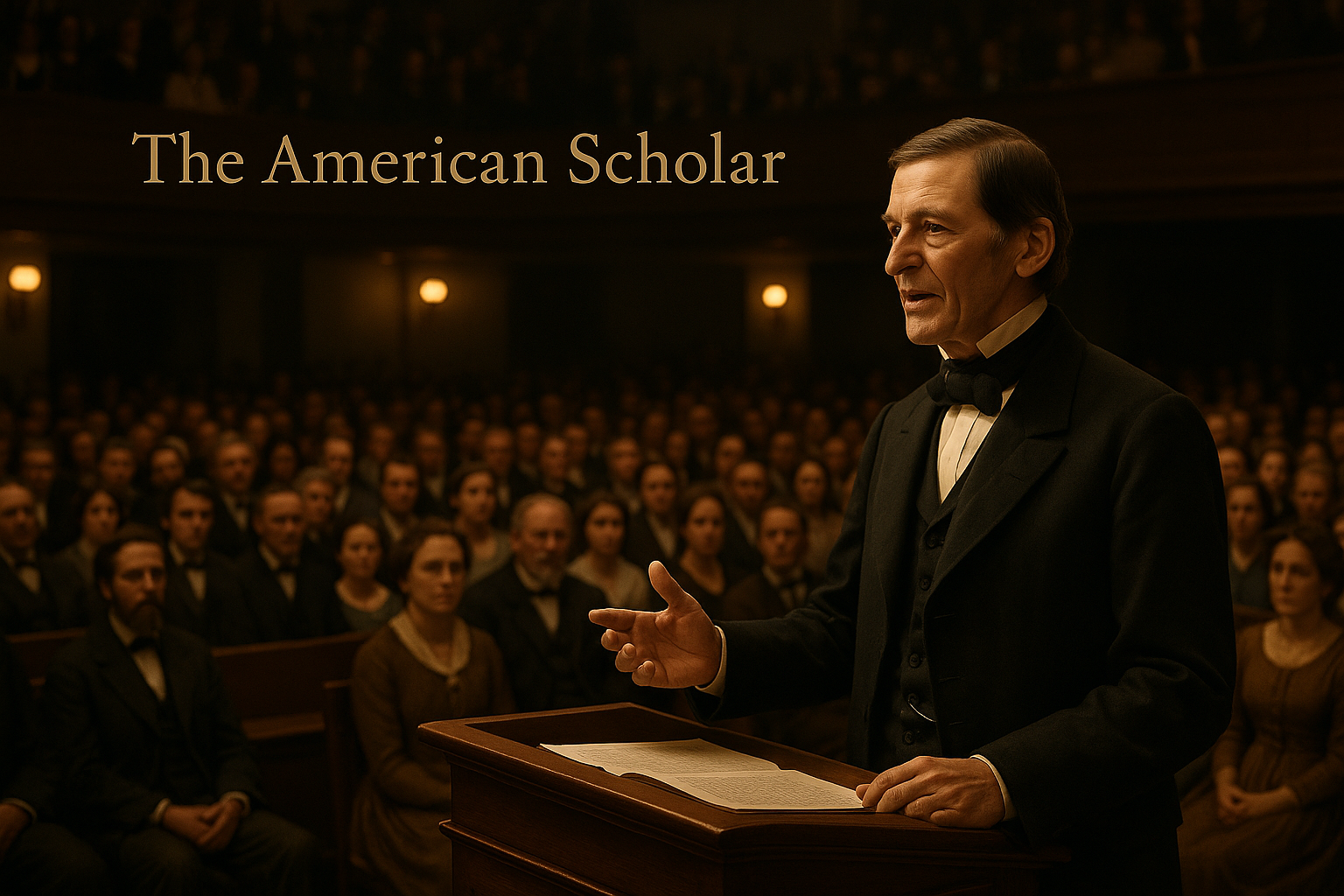Or, The Man Who Looked Deep Into Nature and Found—Himself
By ABS, the Literary Scholar, who believes Emerson walked into the woods, found a pinecone, and came back with a manifesto.
There are thinkers. There are writers. And then there’s Ralph Waldo Emerson—the man who walked into a forest and came out with a personality cult. If American literature were a motivational speaker with really good vocabulary and just a hint of passive-aggressive transcendence, it would be Emerson.
Born in 1803, Emerson began life as a preacher, only to realize that organized religion was cramping his mystical style. So he did what any 19th-century introvert with a God complex would do: he resigned from the pulpit, headed to Europe, met a few Romantics, nodded wisely at Mont Blanc, and came back convinced that every individual had a divine spark, a destiny, and ideally, a journal.
And thus, Transcendentalism was born—or at least trademarked in walnut ink.
He told Americans: stop looking across the Atlantic for approval. Shakespeare’s dead. Milton’s busy. Byron is drunk. You’re enough. Dig your own soil. Drink your own thought. Grow your own damn rose.
In his epic spiritual TED Talk of the 1800s—boldly titled “Self-Reliance”—he basically told everyone to trust their gut, ignore society, and cancel conformity like a boss. “To be great is to be misunderstood,” he thundered, which is probably what every teenager has quoted into their diary right after getting grounded.
But make no mistake: this was not just philosophical posturing. Emerson walked his truth with the long, dramatic stride of a man who wore tailored despair. He saw divinity not in churches but in trees, stars, and the confident sigh of a person who has just rejected all career advice.
He didn’t need a cathedral. He had Nature—which he treated like an Instagram influencer might treat golden-hour sunlight: awe, reverence, and a highly personalized spiritual metaphor. In Nature, he declared that the stars awaken a sense of the sublime, that we are part and parcel of God, and that the universe speaks through the soul—preferably while wearing linen and standing in a field.
Of course, not everyone was on board. But Emerson didn’t care. He was the kind of man who, when told to tone it down, probably replied with a 3,000-word footnote.
He gave commencement speeches that weren’t really about graduates, but about awakening the American spirit. In “The American Scholar,” he stood before Harvard’s intellectual elite (who were expecting a polite academic bore-fest) and delivered an extempore mic-drop. The original speaker didn’t show up. Emerson did. And instead of a formal lecture, he handed America its literary identity like a philosophical birth certificate.
Books? They’re useful, he said—but don’t be their servant. Ideas? Respect them—but don’t rent your intellect out like cheap lodging. Emerson didn’t just want you to read. He wanted you to burn with originality. To “go alone,” to trust your insight even if your great-grandmother and five textbooks disagreed.
And don’t think he left it at that. In “The Poet,” he lamented that America had no true bard of its own yet—right before Whitman grew a beard and took it personally. Emerson had the rare gift of inspiring greatness while simultaneously making you feel like you hadn’t done nearly enough with your life.
But he was no sunshine preacher. He didn’t just sprinkle stardust and say “believe in yourself.” Emerson’s version of optimism was laced with challenge. Yes, there is greatness in you—but it’s going to hurt. It’s going to cost. He dared readers to trust the quiet voice within, even when society was yelling. Especially when society was yelling.
That’s why Self-Reliance isn’t a soft hug of a text. It’s a literary slap with a silk glove. It doesn’t offer affirmations. It offers a dare.
Still, for a man who preached solitude, he managed to collect quite a crowd—Thoreau, Margaret Fuller, Bronson Alcott, and even a few critics who accused him of being all shine and no shovel. But Emerson never claimed to have the last word—only the first insight. He knew truth had to be lived, not lectured.
He was a man of contradictions. Mystical and grounded. Private and public. Wildly idealistic and precisely intellectual. You could agree with him one minute and argue with him the next—and that’s exactly what he wanted. He didn’t want disciples. He wanted awakenings.
And when people asked him what to do with life’s chaos, he didn’t hand them a guidebook. He handed them back to themselves.
ABS, The Literary Scholar, after reading Self-Reliance in one stretch and then promptly deleting three half-written apology emails and a list of unnecessary obligations, stood slowly, adjusted their collar with theatrical conviction, and declared:
“I will no longer quote dead men to prove my point…
Unless it’s Emerson, and the point is me.”
Then, glancing at a group of students trying to summarize Transcendentalism in bullet points, ABS leaned forward and whispered:
“You don’t summarize Emerson.
You stare at a tree for thirty minutes and realize you are the thesis.”

Signed,
ABS
The Literary Scholar
Who now hears the voice of divinity every time the Wi-Fi goes out and is honestly okay with that.
Share this post / Spread the witty word / Let the echo wander / Bookmark the brilliance
